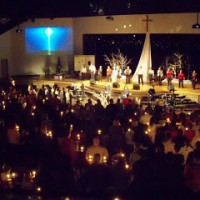Contemporary worship as escape from reality….

Is it poor theology? Or incomplete theology? Or theology that is captive to cultural sensibilities? Or, could it be some combination of all three?
The problem with much Christian worship in the contemporary world, Catholic and Protestant alike, is not that it is too entertaining but that it is not entertaining enough. Worship characterized by upbeat rock music, stand-up comedy, beautiful people taking center stage, and a certain amount of Hallmark Channel sentimentality neglects one classic form of entertainment, the one that tells us, to quote the Book of Common Prayer, that “in the midst of life we are in death.”
It neglects tragedy. Tragedy as a form of art and of entertainment highlighted death, and death is central to true Christian worship. The most basic liturgical elements of the faith, baptism and the Lord’s Supper, speak of death, of burial, of a covenant made in blood, of a body broken. …
The loss of the tragic in the Church reflects the eclipse of tragedy in the broader culture. This is the case made by church historian Carl Trueman in “Tragic Worship,” an article in the June/July issue of First Things.
[T]oday tragedy has, with few exceptions, dropped from popular entertainment. Whether it is the sentimentalism of the Hallmark Channel, the pyrotechnics of action movies, or the banal idiocy of reality TV, the tragic sensibility is all but lost. This is further compounded by the trivial way in which the language of tragedy is now used in popular parlance. As with defining moment and crisis, the words tragedy and tragic are now expected to perform Stakhanovite levels of linguistic labor. In a world where even sporting defeats can be described as tragedies, rarely do the terms speak of the catastrophic moral crises and heroic falls that lie at the heart of great tragic literature.
Yet human life is still truly tragic. Death remains a stubborn, omnipresent, and inevitable reality. For all of postmodern anti-essentialism, for all the repudiation of human nature, for all the rhetoric of self-creation, death eventually comes to all, frustrates all, levels all. It is not simply a linguistic construct or a social convention. Yet despite this, Western culture has slowly but surely pushed death, the one impressive inevitability of human life, to the very periphery of existence.
Pascal observed the problem in seventeenth-century France when he saw the obsession with entertainment as the offspring of the fallen human desire to be distracted from any thought of mortality. “I have often said that the sole cause of man’s unhappiness is that he does not know how to stay quietly in his room,” he said. And: “Distraction is the only thing that consoles us for miseries, and yet it is itself the greatest of our miseries.”
Today the problem is even greater: Entertainment has apparently become many people’s primary purpose of existence. I doubt that it would surprise Pascal that the world has increased the size, scope, and comprehensiveness of distraction. It would not puzzle him that death has been reduced to little more than a comic-book cartoon in countless action movies or into a mere momentary setback in soap operas and sitcoms. Indeed, he would not find it perplexing that the bleak spiritual violence of mortality leaves no lasting mark on the bereaved in the surreal yet seductive world of popular entertainment.
But he might well be taken aback that the churches have so enthusiastically endorsed this project of distraction and diversion. This is what much of modern worship amounts to: distraction and diversion. Praise bands and songs of triumph seem designed in form and content to distract worshipers from life’s more difficult realities. …
Of all places, the Church should surely be the most realistic. The Church knows how far humanity has fallen, understands the cost of that fall in both the incarnate death of Christ and the inevitable death of every single believer. In the psalms of lament, the Church has a poetic language for giving expression to the deepest longings of a humanity looking to find rest not in this world but the next. In the great liturgies of the Church, death casts a long, creative, cathartic shadow. Our worship should reflect the realities of a life that must face death before experiencing resurrection.
It is therefore an irony of the most perverse kind that churches have become places where Pascalian distraction and a notion of entertainment that eschews the tragic seem to dominate just as comprehensively as they do in the wider world. …
For those of us who care deeply about the many ways the Church is shaped by contemporary culture, Dr. Trueman’s “Tragic Worship” merits a close read. And it would be an excellent resource for instruction and discussion by any group of Christians seeking to sort through the complex challenges of living in post-Christian culture.
Carl R. Trueman is Paul Woolley Professor of Church History at Westminster Theological Seminary.


 June 7, 2013
June 7, 2013 







The above is very well put. Most churches confuse “feeling happy” with the deep joy that comes from true heart-felt worship. The popular song (forget the title) “He lives, He lives, Christ Jesus lives today, etc” will never replace or strike the deep cords of joy in my soul as do any of the hymns by Isaac Watts or William Cowper. For many of our churches, the classic Christian hymns stay in their hymnals collecting dust in the pews in favor of a “worship band.”
Doug
Thanks for taking this up; it’s very important. Seems Christianity Today is also discussing music just now. I found most worship leaders and those who create it fail to think along the lines of Trueman or many others who have warned we are losing the meaning of worship…